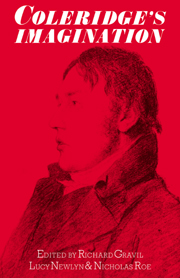Book contents
- Frontmatter
- Contents
- Pete Laver: a memoir
- Abbreviations
- Introduction
- Romantic imagination, nature and the pastoral ideal
- ‘The infinite I AM’: Coleridge and the Ascent of being
- Struggling with the contingent: self-conscious imagination in Coleridge's notebooks
- Coleridge's rejection of nature and the natural man
- The imagination of Mrs Samuel Taylor Coleridge: unknown inspiration of an unknown tongue
- ‘As much diversity as the heart that trembles’: Coleridge's notes on the lakeland fells
- ‘Leaping and lingering’: Coleridge's lyrical ballads
- ‘Radical Difference’: Coleridge and Wordsworth, 1802
- Imagining Wordsworth: 1797–1807–1817
- The Otway connection
- Imagining Robespierre
- Coleridge's Dejection: imagination, joy and the power of love
- Imagining naming shaping: stanza VI of Dejection: an Ode
- Mythopoesis: the unity of Christabel
- The languages of Kubla Khan
- Notes on the contributors
- Index
‘Radical Difference’: Coleridge and Wordsworth, 1802
Published online by Cambridge University Press: 04 August 2010
- Frontmatter
- Contents
- Pete Laver: a memoir
- Abbreviations
- Introduction
- Romantic imagination, nature and the pastoral ideal
- ‘The infinite I AM’: Coleridge and the Ascent of being
- Struggling with the contingent: self-conscious imagination in Coleridge's notebooks
- Coleridge's rejection of nature and the natural man
- The imagination of Mrs Samuel Taylor Coleridge: unknown inspiration of an unknown tongue
- ‘As much diversity as the heart that trembles’: Coleridge's notes on the lakeland fells
- ‘Leaping and lingering’: Coleridge's lyrical ballads
- ‘Radical Difference’: Coleridge and Wordsworth, 1802
- Imagining Wordsworth: 1797–1807–1817
- The Otway connection
- Imagining Robespierre
- Coleridge's Dejection: imagination, joy and the power of love
- Imagining naming shaping: stanza VI of Dejection: an Ode
- Mythopoesis: the unity of Christabel
- The languages of Kubla Khan
- Notes on the contributors
- Index
Summary
Coleridge's growing sense of distance from Wordsworth was accentuated, not caused, by his ‘own peculiar lot’ in 1802; and it did not always produce the envy and exclusion so clearly present in the Letter to Sara Hutchinson. The two men were in fact moving, intellectually and creatively, in opposite directions. Wordsworth at times seemed oblivious of change, and wrote as though the closeness of their earlier relationship still existed. But Coleridge became increasingly aware of ways in which they differed. In a series of justly famous letters, written during this year, one sees him not merely acknowledging divergence, but also (with a sort of doggedness) tracking down its causes. ‘I rather suspect’, he writes to Robert Sou they, in July,
that some where or other there is a radical Difference in our theoretical opinions respecting Poetry – / this I shall endeavour to go to the Bottom of – and acting the arbitrator between the old School & the New School hope to lay down some plain, & perspicuous, tho’ not superficial, Canons of Criticism respecting Poetry.
(CL, II, p. 830)This is the germ of Biographia Literaria. ‘Radical Difference’ is something Coleridge believes to have grown from his increasing dissatisfaction with the 1800 Preface. Wordsworth's claim there, that the language of ordinary life is appropriate for poetry, seems questionable to him, though he cannot yet say why.
- Type
- Chapter
- Information
- Coleridge's ImaginationEssays in Memory of Pete Laver, pp. 117 - 128Publisher: Cambridge University PressPrint publication year: 1985



